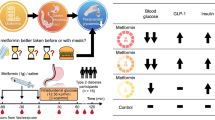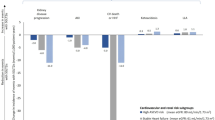Abstract
Ipragliflozin is a novel oral sodium–glucose cotransporter 2 (SGLT2) inhibitor under development for the treatment of type 2 diabetes. We examined its efficacy and safety as an add-on to pioglitazone in Japanese patients with inadequately controlled diabetes. Japanese type 2 diabetes patients were randomized to 24 weeks of treatment with 50 mg ipragliflozin or placebo in a double-blind manner. At week 24, patients with hemoglobin (Hb)A1c <8.4 % were permitted to continue open-label ipragliflozin in a 28-week extension period. The primary endpoint was the change in HbA1c from baseline to week 24 (with last observation carried forward). Ninety-eight and 54 patients were randomized to ipragliflozin or placebo, respectively, and were prescribed the study drug. The mean HbA1c change from baseline to week 24 was −0.64 % and 0.22 % in the ipragliflozin and placebo groups, respectively, and the adjusted mean difference between the two groups was −0.88 % (P < 0.001). Changes in fasting plasma glucose (FPG) and body weight were significantly greater in the ipragliflozin group (both P < 0.001). Among patients who continued ipragliflozin in the extension period, reductions in HbA1c, FPG, and body weight were maintained until week 52. The incidence of treatment-emergent adverse events was not significantly different between the two groups. The most common event with a higher incidence in the ipragliflozin group than in the placebo group was pollakiuria (12/97 vs. 0/54 patients). Ipragliflozin improved glycemic control, promoted weight reduction, and had a good safety profile as an add-on to pioglitazone in Japanese type 2 diabetes patients.




Similar content being viewed by others
References
Sabolić I, Vrhovac I, Eror DB, Gerasimova M, Rose M, Breljak D, Ljubojević M, Brzica H, Sebastiani A, Thal SC, Sauvant C, Kipp H, Vallon V, Koepsell H. Expression of Na+-d-glucose cotransporter SGLT2 in rodents is kidney-specific and exhibits sex and species differences. Am J Physiol Cell Physiol. 2012;302:C1174–88.
Bakris GL, Fonseca VA, Sharma K, Wright EM. Renal sodium-glucose transport: role in diabetes mellitus and potential clinical implications. Kidney Int. 2009;75:1272–7.
Nair S, Wilding JP. Sodium glucose cotransporter 2 inhibitors as a new treatment for diabetes mellitus. J Clin Endocrinol Metab. 2010;95:34–42.
Kadokura T, Saito M, Utsuno A, Kazuta K, Yoshida S, Kawasaki S, Nagase I, Kageyama S. Ipragliflozin (ASP1941), a selective sodium-dependent glucose cotransporter 2 inhibitor, safely stimulates urinary glucose excretion without inducing hypoglycemia in healthy Japanese subjects. Diabetol Int. 2011;2:172–82.
Veltkamp SA, Kadokura T, Krauwinkel WJ, Smulders RA. Effect of ipragliflozin (ASP1941), a novel selective sodium-dependent glucose co-transporter 2 inhibitor, on urinary glucose excretion in healthy subjects. Clin Drug Investig. 2011;31:839–51.
Schwartz SL, Akinlade B, Klasen S, Kowalski D, Zhang W, Wilpshaar W. Safety, pharmacokinetic, and pharmacodynamic profiles of ipragliflozin (ASP1941), a novel and selective inhibitor of sodium-dependent glucose co-transporter 2, in patients with type 2 diabetes mellitus. Diabetes Technol Ther. 2011;13:1219–27.
Fonseca VA, Ferrannini E, Wilding JP, Wilpshaar W, Dhanjal P, Ball G, Klasen S. Active- and placebo-controlled dose-finding study to assess the efficacy, safety, and tolerability of multiple doses of ipragliflozin in patients with type 2 diabetes mellitus. J Diabetes Complicat. 2013;27:268–73.
Kashiwagi A, Kazuta K, Yoshida S, Nagase I. Randomized, placebo-controlled, double-blind glycemic control trial of novel sodium-dependent glucose cotransporter 2 inhibitor ipragliflozin in Japanese patients with type 2 diabetes mellitus. J Diabetes Investig. 2013;. doi:10.1111/jdi.12156.
Wilding JP, Ferrannini E, Fonseca VA, Wilpshaar W, Dhanjal P, Houzer A. Efficacy and safety of ipragliflozin in patients with type 2 diabetes inadequately controlled on metformin: a dose-finding study. Diabetes Obes Metab. 2013;15:403–9.
Inzucchi SE, Bergenstal RM, Buse JB, Diamant M, Ferrannini E, Nauck M, Peters AL, Tsapas A, Wender R, Matthews DR. Management of hyperglycemia in type 2 diabetes: a patient-centered approach: position statement of the American Diabetes Association (ADA) and the European Association for the Study of Diabetes (EASD). Diabetes Care. 2012;35:1364–79.
Dormandy J, Bhattacharya M, van Troostenburg de Bruyn AR. Safety and tolerability of pioglitazone in high-risk patients with type 2 diabetes: an overview of data from PROactive. Drug Saf. 2009;32:187–202.
Smulders RA, Zhang W, Veltkamp SA, van Dijk J, Krauwinkel WJ, Keirns J, Kadokura T. No pharmacokinetic interaction between ipragliflozin and sitagliptin, pioglitazone, or glimepiride in healthy subjects. Diabetes Obes Metab. 2012;14:937–43.
Matsuo S, Imai E, Horio M, Yasuda Y, Tomita K, Nitta K, Yamagata K, Tomino Y, Yokoyama H, Hishida A. Revised equations for estimated GFR from serum creatinine in Japan. Am J Kidney Dis. 2009;53:982–92.
Kashiwagi A, Kasuga M, Araki E, Oka Y, Hanafusa T, Ito H, Tominaga M, Oikawa S, Noda M, Kawamura T, Sanke T, Namba M, Hashiramoto M, Sasahara T, Nishio Y, Kuwa K, Ueki K, Takei I, Umemoto M, Murakami M, Yamakado M, Yatomi Y, Ohashi H. International clinical harmonization of glycated hemoglobin in Japan: from Japan Diabetes Society to National Glycohemoglobin Standardization Program values. Diabetol Int. 2012;3:8–10.
Director, Evaluation and Licensing Division, Pharmaceutical and Food Safety Bureau, Ministry of Health, Labour and Welfare. Guideline for clinical evaluation of oral hypoglycemic agents. Tokyo: Ministry of Health, Labour and Welfare; 2010.
Matthews DR, Hosker JP, Rudenski AS, Naylor BA, Treacher DF, Turner RC. Homeostasis model assessment: insulin resistance and beta-cell function from fasting plasma glucose and insulin concentrations in man. Diabetologia. 1985;28:412–9.
Rosenstock J, Vico M, Wei L, Salsali A, List JF. Effects of dapagliflozin, an SGLT2 inhibitor, on HbA(1c), body weight, and hypoglycemia risk in patients with type 2 diabetes inadequately controlled on pioglitazone monotherapy. Diabetes Care. 2012;35:1473–8.
Bailey CJ, Gross JL, Hennicken D, Iqbal N, Mansfield TA, List JF. Dapagliflozin add-on to metformin in type 2 diabetes inadequately controlled with metformin: a randomized, double-blind, placebo-controlled 102-week trial. BMC Med. 2013;11:43.
Strojek K, Yoon KH, Hruba V, Elze M, Langkilde AM, Parikh S. Effect of dapagliflozin in patients with type 2 diabetes who have inadequate glycaemic control with glimepiride: a randomized, 24-week, double-blind, placebo-controlled trial. Diabetes Obes Metab. 2011;13:928–38.
Bolinder J, Ljunggren Ö, Kullberg J, Johansson L, Wilding J, Langkilde AM, Sugg J, Parikh S. Effects of dapagliflozin on body weight, total fat mass, and regional adipose tissue distribution in patients with type 2 diabetes mellitus with inadequate glycemic control on metformin. J Clin Endocrinol Metab. 2012;97:1020–31.
Campbell IW. Comparing the actions of older and newer therapies on body weight: to what extent should these effects guide the selection of antidiabetic therapy? Int J Clin Pract. 2010;64:791–801.
Kaku K, Inoue S, Matsuoka O, Kiyosue A, Azuma H, Hayashi N, Tokudome T, Langkilde AM, Parikh S. Efficacy and safety of dapagliflozin as a monotherapy for type 2 diabetes mellitus in Japanese patients with inadequate glycaemic control: a phase II multicentre, randomized, double-blind, placebo-controlled trial. Diabetes Obes Metab. 2013;15:432–40.
Acknowledgments
Ipragliflozin is under development by Astellas Pharma Inc. and Kotobuki Pharmaceutical Co., Ltd. This study was sponsored by Astellas Pharma Inc. Medical writing and editorial support was funded by Astellas Pharma Inc., and was provided by Dr. Nicholas D. Smith and ELMCOM™.
Conflict of interest
TS, NA, KK, AU, SY, and EU are employees of Astellas Pharma Inc. AK has acted as a consultant for Astellas Pharma Inc. and has received consulting fees/honoraria from Astellas Pharma Inc.
Author information
Authors and Affiliations
Corresponding author
Appendix
Appendix
Primary investigators: Kazuo Yamagata (Sakajiri Naika Iin), Hideki Kuribayashi (Aohitokusa Kuribayashi Clinic), Daishiro Yamada (Jiyugaoka Yamada Clinic of Internal Medicine), Fuminobu Okuguchi (Okuguchi Clinic of Internal Medicine), Hiroshi Kouno (Jusendo General Hospital), Shuichi Fukuda (Wakakusa Clinic), Hirokazu Shoda (Seiwakai Shoda Hospital), Hideto Ishii (Asano Internal Medicine Clinic, Medical Corporation Yukeikai), Tomio Tsukazaki (Aozora Total Clinic), Shinya Minagawa (Minagawa Clinic), Madoka Taguchi (Toshiba General Hospital), Katsuhiko Yamada (Kousei Medical Clinic), Masahiro Sugawara (Sugawara Clinic), Koki Shin (Shin Clinic), Yoshio Ohashi (Tokyo Ekimae-building Clinic), Takaaki Iwai (Sagamino Central Hospital), Ikuro Matsuba (Matsuba Clinic), Ichitaro Takada (Takada Internal Medicine Clinic), Mizuki Kaneshiro (Kaneshiro Diabetes Clinic), Yoichi Koizumi (Komoro Kosei General Hospital), Takuro Ichikawa (Ichikawa Clinic), Kotaro Kawai (Shimada Municipal Hospital), Naoko Hirahara (Shimada Municipal Hospital), Kiyomitsu Ikeoka (Medical Corporation Ikeoka Clinic), Sadahiro Sempuku (Senpuku Clinic), Tetsuji Okuno (Nippon Kokan Fukuyama Hospital), Yasuo Toh (Healthcare Corporations Association Kunwa-Kai Aiwa Clinic), Daigaku Uchida (Medical Corporation Hotaruno Hakuyukai), Tsuguyoshi Asano (Asano Kanamachi Clinic), Makoto Sugiura (Specified Medical Corporation Tokoharu and Touei Hospital), Tamayuki Koizumi (Medical Corporation Pieta Association Ishikari Hospital), Munenori Okamoto (Sapporo Century Hospital), Masahiko Takai (Medical Corporation Takai Internal Medicine Clinic), Yoshiyuki Arai (Arai Clinic), Masakazu Kato (Kato Internal Medicine Clinic), Kazunori Yokoyama (Nikko Memorial Hospital), Kazuo Satake (Fukui General Clinic), Yasuhiro Hashiguchi (Tenpozan Internal Clinic).
About this article
Cite this article
Kashiwagi, A., Shiga, T., Akiyama, N. et al. Efficacy and safety of ipragliflozin as an add-on to pioglitazone in Japanese patients with inadequately controlled type 2 diabetes: a randomized, double-blind, placebo-controlled study (the SPOTLIGHT study). Diabetol Int 6, 104–116 (2015). https://doi.org/10.1007/s13340-014-0182-y
Received:
Accepted:
Published:
Issue Date:
DOI: https://doi.org/10.1007/s13340-014-0182-y




